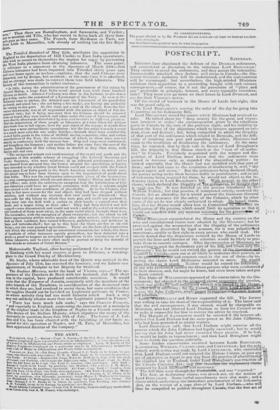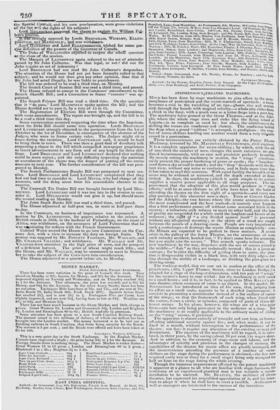POSTSCRIPT.
SATURDAY.
Ministers have abandoned the defence of the DURHAM ordinances, andsurrendered at discretion to the victorious Lord Baorctiaat ! They submit to annul the ordinances, and they accept the indemnity. Inconceivable mischief, they declare, will ensue in Canada—the Go- vernor-General's authority will be undermined, and the malecontents will be encouraged : but nevertheless, the high.minded Ministers withdraw their opposition to a proceeding fraught with such ruinous consequences,—of course, for is not the possession of " place and pay" preferable to principle, honour, and every reputable considera- tion ? They must now go down on their knees to Lord DURHAM, and cry for their Viceroy's mercy.
Of the crowd of business in the Ilouse of Lords last night, this was the grand subject.
On Lord BROUGHAM'S moving the order of the day for going into Centmittee on his Indenmity Bill, Lord Mer.uounNE stated the course which Ministers had resolved to take.He talked about his " deep anxiety for the great and impor- tant interests at stake," the encouragement given to the rebellious party in Canada by the vote of the previous night, and his inability to discern the force of the objections which to lawyers appeared so evi- dent, clear, and distinct ; but, being compelled to admit the illegality of that part of the ordinances which related to Bermuda, and the diffi- culty of retaining one part and annulling the other, Ministers had come to the resolution of disallowing the ordinances. At the same time, he repeated, that by their vote in favour of Lord Brougham's bill, the majority in that House struck at the "root of all autho- rity" in Canada. Everybody acquainted with the temper and dis- position of Lord Durham must know that the ordinances were passed in ierrorem only, as regarded the absconding parties : be wished especially that the House had not meddled with that part of them ; and he had conic to the resolution of disallowing it, with " the deepest regret and alarm." But the ordinances being declared illegal, the parties acting under them became liable to punishment ; and an act of indemnity being required for them, be should not object to the in- demnity clause in Lord Brougham's bill. With respect to the other( ; clause, which declarerlAhe illegality_ of the orii-Dituctsalie Uorfie it that ( it \Lela_ too far. It was founts ed on the proviso introduced btThir} NVilliam Follett ; but that proviso, if interpreted strictly, rendered the , Canada Act an absurdity, for it would prevent the Governor. General from taking measures for the safety of the Colonies, which by other 1, parts of the act he was clearly authorized to adopt. He hoped, there- fore, that the House would allow him in Committee to inttce ant "exilanation-61-the proviso, which would limit its operation so that it Would not interfire With any measure necessary for the govermwewt of t■ Cannes. - -"Mbra -Brim:Gleam congratulated the House and the country on the wise and constitutional course now adopted by the Ministers; but he protested against the assumption that the illegality of the ordinances could only be discovered by legal acumen, for it was palpable shad monstrous—visible at first sight to every person who could read. lie utterly denied that the disposition evinced by the House of Lords to protect the lives and liberties of the colonists would be likely to pro- voke them to commit outrages. After the concession of Alinisters he was willing t.omit the declaratory part of his VIII-iinnaiatrigiTirte 'indemnity ; but he would not extend the gtowers 'Cotinetritt Canada—MeR not at all likely to underrate their powers, or to be gtIgitTlirruy 11r7 and common sense in the use of them—by in- serting the clause Lord Melbourne intended to move. Ile would leave the law as it stood. Neither would he extend the iliffenmty , to any acts performed aguinst the fifteen persons who were condemned 41 in their absence, and, for aught he knew, had since beets taken and put to death untried.
The Duke of 1VELLINGTON approved of the course taken by the Go- verainent ; lot objected to thero osetplause respecting the proviso, which was iFfectly w mell u erstoo i when t was passd b t House. Neither was It necessary ; rorilie. Canada Act nave Lozutham.a' it gave Sir John Colborne, iiireToster to suppress and.punish treason I --tortrITTnTRIeet.IFFE and RIPON supported the bill. The former was willing to take his share of the responsibility of it. The latter said that the evil consequences, if any ensued, would be chargeable on Ministers, who had allowed Lord Durham to form his Council so as to make it impossible for him to receive the advice he required. The Marquis of LANSDOWNE would be satisfied if the lawyers ad. mitted that Lord Durham had the same power as Sir John Colborne,. who had been permitted to attaint traitors. Lord Bum:Guam said, that Lord Durham might exercise all the powers which Sir John Colborne had legally exercised ; but he would not say that Sir John had never exceeded those powers. If he had, he would be liable to impeachment ; and then Lord 13roughata might have to decide the question judicially. Some further conversation occurred between Lords BROUGHAM, LANSDOWNE, WICKLOW, CLANRICARDE, and COTTENIIAM ; bid the tidy , remark worth notice. mist made by Lord Corn:411am, who colitein ed.. 4 ..that—Lottl Durham could not suspend the Habeas Corpus, Or pass any_ act of attainder, or depart in any way from the practice of affiniiiittering "the (.7:Cana law in England, under-Lord-traugiiiiib's congruerian of tli;: ()mad,' Cor;reiini Act ; -and-rlytt—therefore-thr-explarratoirrlamre
_
proposed hy GoTil Eiraffirwas neeeSsary.
The bill then went tlnough the Cu Itter, and was "reported." The first, or declaratory clause, was struck out, on the motion of Lord BROUGHAM. Some verbal amendments %%VIC RISCO made • and a clause added, authorizitig the immediate proclamation of the Indemnity Act, on the receipt of a copy thereof by Lord Durliam,--who will thus be compelled to publish throughout Canada, that the first act of
the Speleial Cotuleil, and his own proclamation, were gross violations of the law aP.',1 the rights of his subjects!
\ Lord 12,1EteouRNe preposed the clause to explain Sir William Egl,
- ......_.--_
left's proviso.
it w-as strongly opposed by Lords BROUGHAM, WtettLow, ELLEN. BOROUGH, and MANSFIELD ; and was withdrawn. " Lor Mriitttit-war and Lord ELLErtaniatuGa wished for some lai- cise le iiion of the powers of the Governor of Canada. "The Duke of WELLINbarci-N objZ-Etel rolelifien the-4ton question at the close of the session.
The Marquis of LANSDOWNE again referred to the act of attainder passed by Sir John Colborne. Was that legal, or not? did not Sir John require an act of indemnity ? Lord BROUGHAM had not read Sir John Colborne's despatches. The attention of the House had not yet been formally called to that subject; and he would not then give any other opinion, than that if Sir John had acted illegally, he was liable to punishment. The bill was ordered to be read a third time, on Monday. The Scotch Court of Session Bill was read a third time, and passed.
The House refused to concur in the Commons' amendments to the Scotch Sheriffs Bill ; and a Committee to frame " reasons " was ap- pointed.
The Scotch Prisons Bill was read a third time. On the question that it "do pass," Lord MANSFIELD spoke against the bill; and the House decided not to pass it, by a vote of 13 to 11.
The Registration of Electors Bill went through the Committee, with some amendments. The report was brought up, and the bill is to be a read a third time this day.
Some conversation occurred respecting the time when the Imprison- ment for Debt Bill should come into operation. Lords BROUGHAM and LYNDHURST strongly objected to the postponement from the 1st of October to the 1st of December, in consequence of the absence of the Judges, who were to frame certain rules. The Judges might sit in bane° during the vacation. Lord CorresmAsi said, it would be hard to bring them to town. There was then a good deal of desultory talk respecting a clause in the bill which compelled newspaper proprietors to insert advertisements in any form and of any length for three shil- lings. Lord BROUGHAM and Lord LYNDHURST declared that nothing could be more unjust ; and the only difficulty respecting the omission or amendment of the clause was, the danger of putting off the entire measure to next year. The further consideration of the bill was post- poned to Monday.
The Scotch Parliamentary Burghs Bill was postponed to next ses- sion. Lord BROUGHAM and Lord LYNDHURST complained that they Lad not bad time to consider it. Lord Misnro, who bad charge of the measure, said the delay arose from his unavoidable absence in the country. The Cornwall Tin Duties Bill was brought forward by Lord MEL. BOURNE. Lord LYNDHURST said it was too late in the session to con- sider it. Lord MELBOURNE would not give it up, but should move the second reading on Monday. The Joint Stock Banks Bill was read a third time, and passed.
The House adjourned at half-past ten, to meet at half-past three to-day. In the Commons, no business of importance was transacted. A motion by Dr. LUSHINGTON, for papers relative to the seizure of British vessels in 1834, in the harbour of Portandique, on the coast of Africa, was withdrawn, on the assurance of Lord Palmerston that he was negotiating for redress with the French Government.
Colonel WOOD moved the House to go into Committee on the Cus- toms Act, with a view to increase the duty on foreign fruits. The motion was opposed by Mr. POULETT THOMSON, Mr. WALLACE, and 31r. CHARLES VILLIERS ; and withdrawn. Mr. WALLACE and Mr. VILLIERS (hew attention to the high price of corn, and the prospect of a deficient harvest. The price of wheat might reach 100s., and the House, said Mr. WALLACE, may be summoned to meet in Novem- ber to take the subject of the Corn-laws into consideration. The House adjourned at a quarter before six, to Monday.



























 Previous page
Previous page